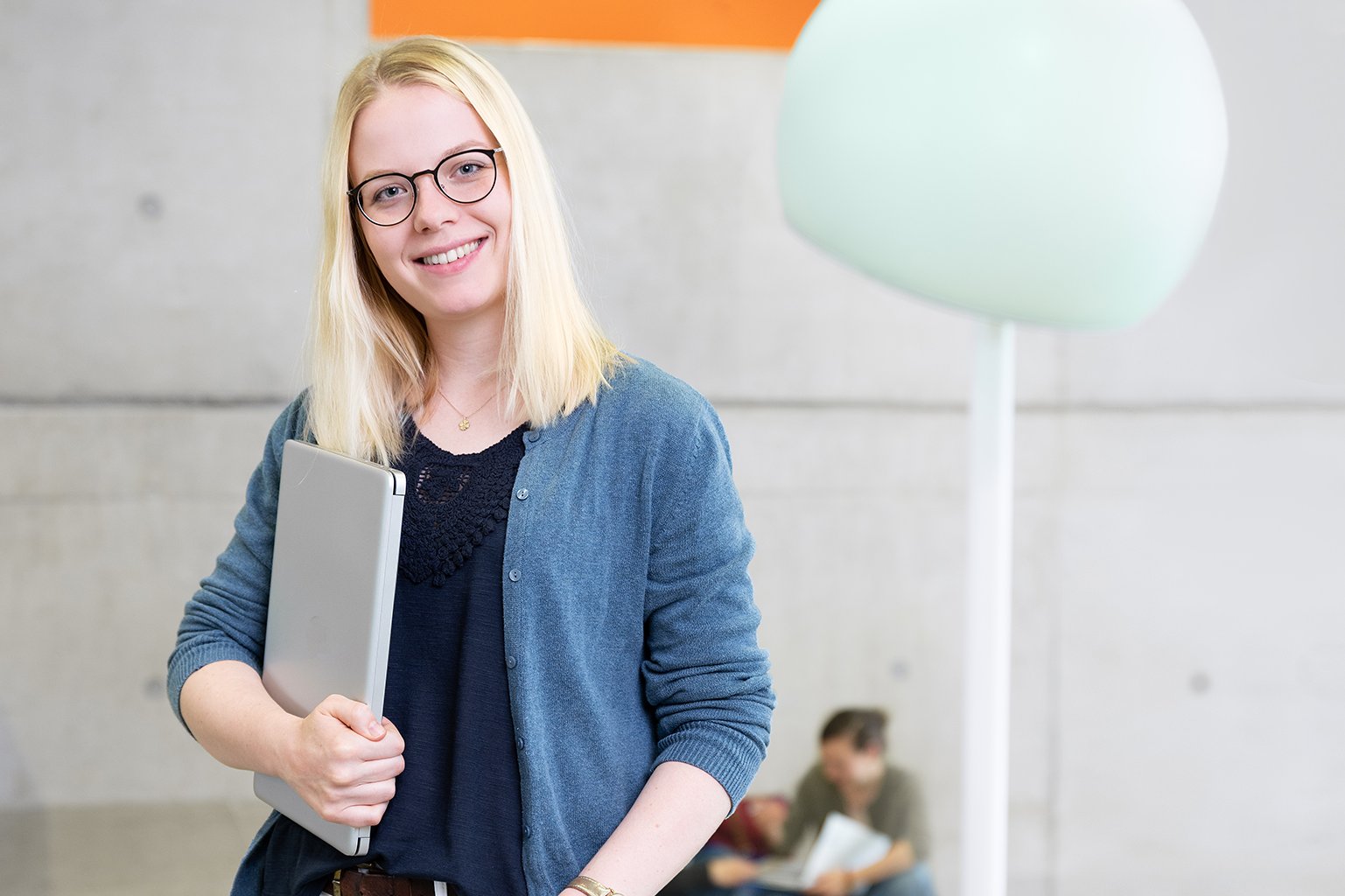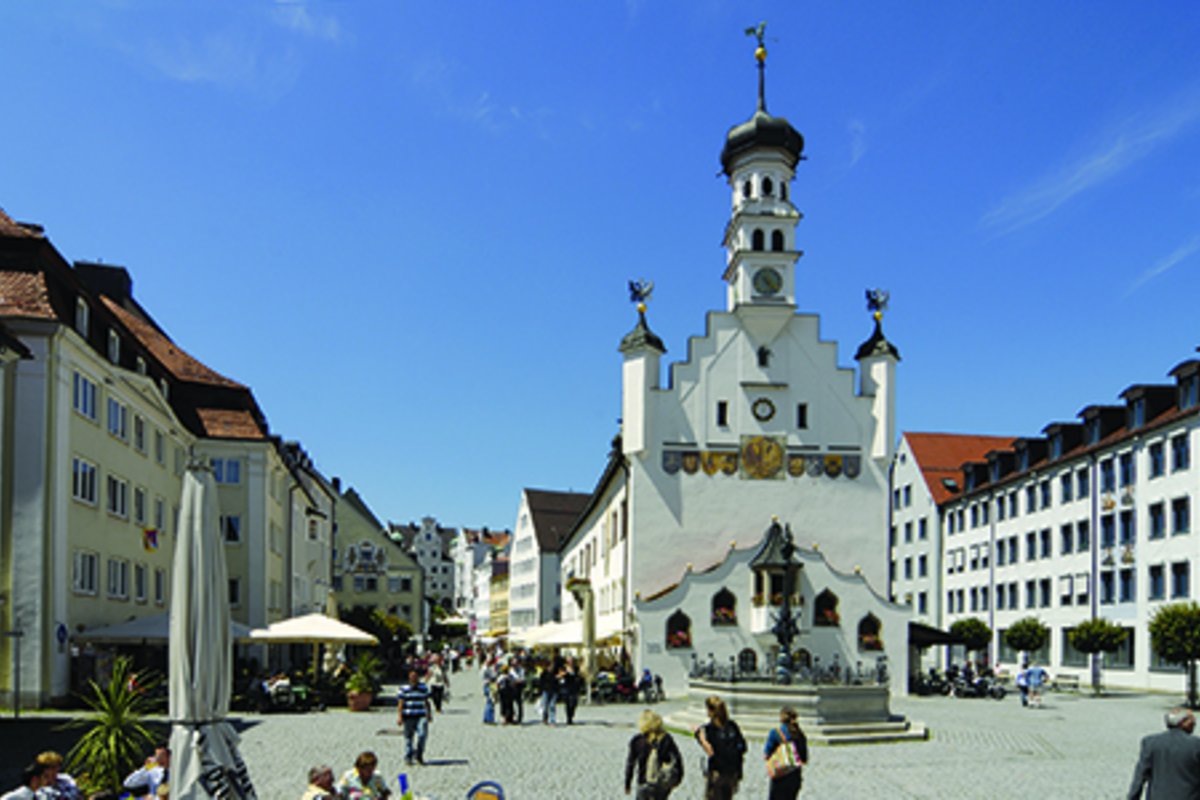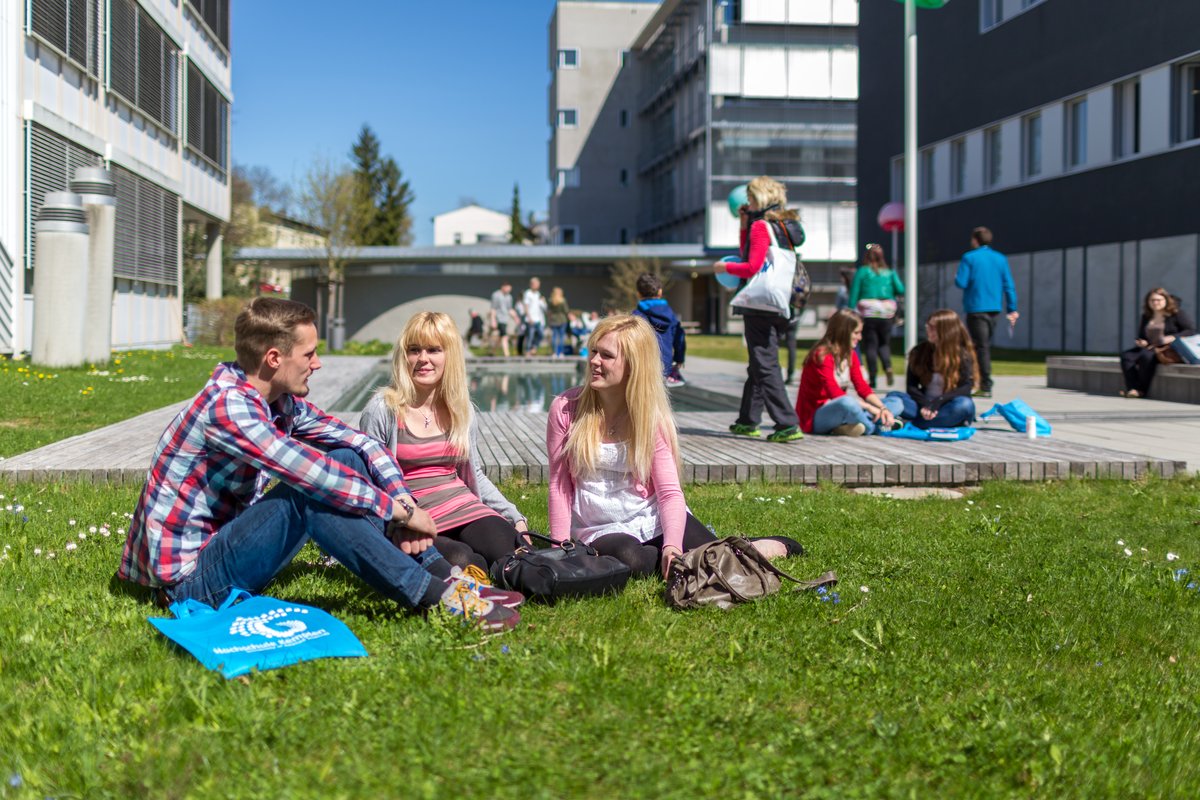
Are you already working in health care and would now like to focus specifically on elderly welfare? This bachelor’s degree programme prepares you exceptionally well for performing responsible and complex tasks in advising, treating, supporting and caring for the elderly.
It is directed at state-certified (in Germany) staff trained in elderly care, health care and nursing, physiotherapy, ergotherapy, or professional nurses wishing to specialise in geriatric needs. Throughout your studies, we support you with tutorials, small learning groups, special programmes for students and intensive mentoring for final theses.
In addition, you can expect practically relevant teamwork and learning, a friendly atmosphere and professors who know you by name.
At a glance
Award
Bachelor of Science (B. Sc.)
Study mode
part-time professional
Standard duration
7
ECTS credits
210
Starts
winter semester
Restricted admission
no
Taught in
German
Faculty
Social and Health Studies
Study abroad
optional
Accreditation
AHPGS, German Accreditation Council
Details about this course
This degree programme builds upon the training conducted for certified health care professions (see applying and admissions), which can be counted as 70 ECTS Credit Points, in which case the programme can be completed in professional part-time mode over seven semesters.
The first six semesters of teaching convey gerontological knowledge and the ability to take appropriate action, focusing on the subjects of ageing and the environment and looking at organisational structures in elderly care. Students learn about geriatric medicine, psychology and psychiatry in order to be able to identify, evaluate and treat the particular characteristics of elderly patients and their specific symptoms, syndromes and areas where problems arise. In addition, modules are offered on legal, organisational and financial parameters and on case, quality and project management. Furthermore, students learn the relevant applied scientific methodologies for tackling gerontological issues and the ability to adopt evidence-based approaches to working in teams. In one section of the course, students can choose freely from a broad range of general elective and specialist compulsory elective modules.
During the seventh semester, you will work independently on your bachelor’s thesis, under specialist supervision, as you tackle a scientific question focusing on any aspect of the full spectrum of the degree programme.
Upon successfully completing this degree programme, you will qualify as a gerontologist and the university of applied sciences will award you the academic degree of Bachelor of Science (B.Sc.) .
To make it as easy as possible to combine studying with work commitments, we plan in firmly scheduled study days. Classes are held during four-day blocks at the start and end of each semester together with one day per week in between. The timetable for these is firmly fixed for at least two semesters, allowing rotas to be worked out well in advance to accommodate students’ needs.
Professional environment
This programme qualifies you to undertake particularly complex and demanding tasks in advising, treating, supporting and caring for elderly people. Treating, rehabilitating and caring for geriatric patients calls for specially trained staff. Advising and caring for the elderly in their own homes, local authority care facilities or homes for the elderly calls for experts who combine specialist knowledge with skills in advising and planning provision. Our graduates work on full-time and wards, in out-patient clinics or for local authorities, as well as in consultancy roles or for service providers.
Career prospects
By earning a university degree in “Gerontological Nursing and Therapy”, you will play a pioneering role in driving up academic standards in the health care professions. You can work throughout the entire health care sector – in hospitals, clinics, out-patient clinics, hospices, day and short-term care, medical centres, rehabilitation facilities, elderly and social care homes, or for health insurance funds, training providers, local authority care advisory services or housing management.
Potential roles include:
- Managing or coordinating multi- or inter-professional teams in the health care sector
- Continuing conceptual development of facilities, departments and providers of age-appropriate health-care services
- Advising and educating patients, advising and training their family members
- Advising on care
- Interface management, e.g. transition from residential to mobile provision
- Managing or working on gerontological projects
- Housing management
- Conducting situational training
- Giving practical instructions
Specific jobs and roles stem from continuing developments in the health sector and the latest legal provisions, according to the changing requirements that need determining and directing collaboratively between the different professions.
Successful completion of the third semester of this degree programme already earns students official recognition as specialist staff by the MDK Bayern, by providing the required evidence of at least 180 hours of structured curricular additional training in geriatrics to fulfil the technical requirements of OPS 8-550.
In the course of your studies, you will acquire the additional qualifications of “gerontopsychiatric specialist” (§§ 78‑81 AVPfleWoQuG) and “care adviser” (§ 7a SGB XI).
Application process
We have pooled all the information and details you might need about applying and the admission requirements .
Admission requirements
Have you already completed state-certified training in Germany in elderly care, medical and nursing, physiotherapy, ergotherapy or nursing, and are you particularly interested in the health, psychological and social concerns of the elderly? Then you meet the criteria for this bachelor’s degree programme to a tee!
Even if you are not automatically eligible for university, you can also apply on the basis of your vocational qualifications – in the form of either a “promotional qualification” (master in trades or equivalent advanced certificates or qualifications) or the relevant basic vocational training and at least three years of primary professional experience thereafter. You can find further details in the Bavarian Law on higher Education or under Information for trained workers and masters of trades.
We ascribe to the values of openness, tolerance and acceptance. Our aim is to teach everyone involved at Kempten University of Applied Sciences about education in an international context. As part of this, we support university-wide, inter-faculty measures to promote international projects and cross-cultural interaction aimed at promoting diversity.
Academic achievements from studies abroad can be counted towards this degree programme if the skills in question are broadly similar.
Would you like to learn more about our international focus and the options we offer to study abroad? Then please take a closer look at our portal.
We compile all study programme and examination regulations centrally for you. There you will find all versions and changes. continue
Master's degree programmes
Graduates from this bachelor’s degree programme can go on to study on the following master’s degree programme at Kempten University of Applied Sciences:
Further details about the degree programme
Contacts
We know how exciting the prospect of going to university can be. So we want you to know whom you can get in touch with if you have any questions about studying with us.
- Student Advisory Service
For general questions about studying and applications, please contact the Student Advisory Service. - Academic advice
If you have any questions about the degree programme in Gerontological Nursing and Therapy, please contact an academic advisor.
Fees
There are no tuition fees for this degree programme. The only expenses will be the usual costs associated with studying, such as the semester fee, photocopying and books. There might also be some field trips and travel expenses to off-site study locations. If studying will prevent you from otherwise working, you will need to consider loss of earnings, of course. There are various sources of funding to help you study. It is definitely worth checking whether you are eligible for BAföG or perhaps a bursary (Kempten University of Applied Sciences – bursaries). In particular, we would like to draw your attention to the Professional Advancement Bursary and the “Deutschlandstipendium”.
Notes about certification as a facility / care manager
During the programme, you can choose to take an additional module if you wish, for a fee, that formally qualifies you as a facility manager. The module is assessed by means of an oral examination. You then need to complete 40 hours with the management of an acute clinical facility, rehabilitation clinic or elderly care facility (partly or entirely residential). This enables previously trained carers or nurses to then add the formal qualification of care manager.
FAQ
How will this qualification help me professionally? Where can I work afterwards? What jobs can I do?
This programme qualifies you to undertake particularly complex and demanding tasks in treating, supporting and caring for elderly people. Potential fields of work include geriatric acute medical and rehabilitation clinics, gerontopsychiatric clinics, care facilities, hospices and palliative services, housing management, care advisory services, to name just a few. You will continue to work closely with people in need of care, but in a more independent position. You can find specific examples of professions and areas of work under “Prospects for graduates”.
I can’t / don’t wish to work directly with patients / clients anymore. Does this programme give me the chance to move into other areas of work?
Fundamentally, this degree programme aims to train students for working closely with patients / clients, but for greater responsibility, more complex requirements and managerial roles. However, it also qualifies you to perform activities that no longer involve nursing/therapeutic duties or direct contact with patients/clients.
Nonetheless, it doesn’t qualify you for conventional administrative positions in the healthcare sector, which require considerably more business and legal knowledge, as taught on the bachelor’s degree programme in healthcare sector management, for example.
What job prospects does this qualification present?
It offers very good job prospects – in caring and nursing services, and even more so in geriatric clinics and local authority health service provisions. These organisations are crying out for trained staff, particularly with specialist qualifications for working in geriatric clinics, which are a legal requirement.
In terms of academically qualified healthcare specialists in general, numerous facilities are very interested in trying out new approaches to caring for and treating elderly people and developing new concepts, which calls for staff with new kinds of qualifications. Kempten University of Applied Sciences liaises closely with geriatric clinics and organisations around the Allgäu providing care for the elderly to alert them to the new cohort of graduates. Some of them are also involved in the degree programme, enabling you to make contact with prospective employers early on. In addition, the university informs geriatric-gerontologically relevant facilities, associations and networks all over southern Germany about this degree programme, so it’s becoming increasingly generally well known.
Until now, all the graduates from the previous degree programme in Geriatric Therapy, Rehabilitation and Nursing have found commensurate positions in a wide range of jobs in healthcare services.
Will I earn more once I gain this qualification?
This is a possibility, although the university is not in a position to offer a guarantee, as salaries are either fixed or freely negotiated between employers and employees. Fundamentally, facilities interested in specialist healthcare staff with academic qualifications know that they have to offer adequate salaries. If they are so inclined, they will generally find appropriate means of funding, although this proves easier for private operators than for state-run or church-funded facilities, who are bound to fixed remuneration scales. Having said that, there is also potential in those segments.
Can I work at the same time as studying?
What you do alongside studying is pretty much up to you, so working on the side is certainly an option. Almost all students do so. However, please be aware that you need to carefully plan time for private study to avoid hampering your academic performance as a whole. It is therefore advisable not to over-commit to paid work at the start of your studies so you can first of all gauge how much time you will need for studying and what scope there is for employment alongside. The lecture-free periods (15 Feb. – 14 March and 1 Aug. to 30 Sep.) lend themselves well to working extra hours to leave you more space during the semester.
Can I study this degree programme remotely?
No, this programme runs entirely in situ, i.e. almost all classes are held on campus, with a few conducted off-site (e.g. at a clinic or care facility) and only a tiny proportion (1 hour per week each semester) online. However, a substantial part of the degree programme consists of private study, such as in preparation for and after classes, writing study papers or revising for examinations. It is, of course, up to you where you spend this time.
Is attending classes obligatory?
No, but we strictly recommend attendance. For one, teaching – and thus learning successfully – thrives on direct exchange amongst students and between students and lecturers. Plus, experience has shown at least a loose correlation between attending classes and achieving good results. In other words, the students who fail exams or scrape through with weak grades tend to be those who rarely attended the related classes.
I have completed vocational training, but not in elderly care, healthcare and nursing, physiotherapy or ergotherapy. Can I study this degree programme nonetheless?
No, it’s absolutely essential to have trained in one of the cited vocations to be admitted to this degree. Even professionally trained staff in similar occupations, for example curative education, are not currently admitted. Should any additional fields of training be accepted in the future, you will see on the website.
As an alternative, you might consider studying for the B.Sc. in Nursing, fundamentally training you as an academically qualified nurse, commencing in Winter Semester 2021/2022 at Kempten University of Applied Sciences. Further details can be found here.
I am trained in one of the cited vocations, but not in Germany. Can I apply nonetheless?
Yes, as long as your training has been deemed equivalent to one of those cited in accordance with the Law on Recognition of Vocational Qualifications (“Berufsqualifikationsfeststellungsgesetz”). If this isn’t the case, you can find information about the recognition process at www.bq-portal.de/en and www.anerkennung-in-deutschland.de/html/en. You can also seek assistance from the recognition advisory service “Tür an Tür” (“Door to door”) in Augsburg at: https://www.migranet.org/angebote/ratsuchende/anerkennungsberatung/aeb-kontakt#AEB-A.
Some further sources of advice in Germany are listed here: www.anerkennung-in-deutschland.de/html/de/beratungsstellen_iq_netzwerk.php.
I am trained in one of the accepted vocations, but I don’t have a college/school leaving certificate for entering higher education. Can I apply nonetheless?
Yes, candidates who are vocationally trained but don’t have a university entrance certificate (from a school or college) can also be admitted. Instead, you will need either a “promotional qualification” (master in trades or equivalent advanced training certificates or qualifications) or the relevant basic vocational training and at least three years of primary professional experience thereafter. You can find further details in the Bavarian Law on Higher Education or under Information for trained professionals and masters of trades.
I would like to study on your degree programme immediately after completing my vocational training. Is this possible?
Yes, as long as you have completed training in one of the accepted vocations and have have a university entrance certificate from a school or college. If you don’t hold this kind of academic qualification, it is absolutely crucial to have gained at least three years of primary professional experience since completing your training. You can find further details in the Bavarian Law on Higher Education or under Information for trained professionals and masters of trades.
Is there an age limit for admissions?
There is no age limit, as it admissions are not restricted. (Article 1 para. 3 BayHZG sets a general age limit for all restricted-entry degree programmes, but that does not apply to unrestricted programmes such as this.)
Besides completing initial vocational training, I have also undergone substantial advanced training and professional development (e.g. specialising in gerontopsychiatrics). Can this also be counted towards the degree programme?
That depends on both the content, duration and level of the training / professional development and whether it corresponds with any modules, or at least part-modules, on the programme. Please contact an academic advisor in the first instance to discuss the scope for counting further training towards the degree programme. The next step is to apply to the Examinations Board to consider your case. The Board will then check your particulars and decide whether the training can be counted or not.
As a matter of principle, the university can count non-university performance towards a maximum of 50 percent of the credits required to complete degree programmes. As you would already be awarded 70 of the full 210 Credit Points for the first two semesters on the basis of non-university performance, this leaves a maximum of 35 Credit Points that can potentially be credited in this way.
Why is there no practical semester? Are there still practical elements to the programme?
The practical semester is taken as covered by your vocational training, as the practical parts of that serve the same purpose as the practical semester and lasted considerably longer. Nonetheless, practical elements (e.g. short internships, placements, practical teaching, project work) are included in various modules.
What are the semester dates, and do students have any commitments during vacation time?
The semester dates are shown in the university calendar. You can use the vacation time between semesters for further study, if required, but as a rule there really aren’t any commitments during those times. You can check the precise times and locations for classes under the above tab “Where and when”.



